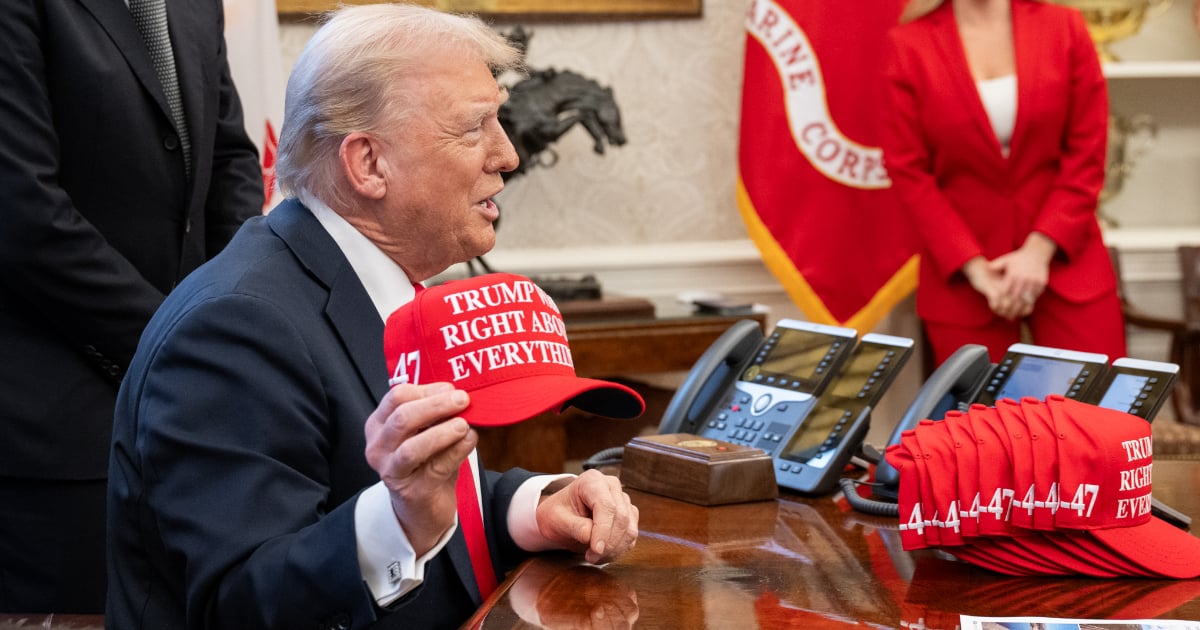
Related videos:
The president of the United States, Donald Trump, reaffirmed his decision to impose a 25% tariff on imports from Mexico and Canada starting March 4, as he believes that both countries have not shown sufficient progress in the fight against fentanyl trafficking. Additionally, he announced a further 10% increase in tariffs on Chinese products, raising the total tariff burden to 20%.
Trump justified the measure in statements from the Oval Office, stating that "drugs continue to arrive in our country and are killing hundreds of thousands of people. Many of them come from Mexico and China." In his message on Truth Social, he warned that tariffs will take effect next Tuesday, unless there are significant improvements in the fight against fentanyl trafficking.
Pressure on Mexico and Canada
The U.S. leader indicated that his government granted Mexico and Canada a one-month deadline to show progress in border control and anti-drug efforts, but in his view, the efforts have been insufficient. “We cannot allow this scourge to continue harming the United States, so until it is stopped or seriously limited, tariffs will take effect as planned,” Trump stated.
In light of the imminent implementation of tariffs, a Canadian delegation led by Minister of Public Safety, David McGuinty, and the new fentanyl czar, Kevin Brousseau, traveled to Washington to try to persuade the White House that the country should not be penalized. Canada claims that its involvement in the trafficking of fentanyl to the U.S. is minimal, with only 19.5 kilograms seized out of a total of 11 tons confiscated by U.S. authorities in 2024.
For her part, the President of Mexico, Claudia Sheinbaum, expressed her confidence in reaching an agreement with Trump before March 4. “I hope we can announce something else on Tuesday. We will see how these negotiations develop,” the president stated at her morning conference. A Mexican delegation led by Foreign Minister Juan Ramón de la Fuente is already in Washington to address the matter with Secretary of State Marco Rubio.
Increase in tariffs on China and warning to the European Union
In addition to tightening his trade policy with Mexico and Canada, Trump confirmed that tariffs on Chinese products will increase by an additional 10% starting March 4, totaling 20%. "This 10% is on top of the 10% already imposed this month," the president explained, pointing out that the measure responds to the lack of progress in the fight against fentanyl trafficking, for which he blames China as the main supplier of chemical precursors.
The president also reiterated his intention to apply "reciprocal tariffs" to the European Union, arguing that the community bloc has harmed American companies through taxes and lawsuits. "They have imposed tariffs in the form of value-added taxes of approximately 20%. They have sued Apple, Google, and other companies. We are going to change that," Trump stated.
Economic impact and trade tensions
The tightening of Trump’s tariff policy has raised concerns in the markets and among businesspeople in the affected countries. Analysts warn that these measures could impact bilateral trade with Mexico and Canada, the main trading partners of the U.S. under the USMCA agreement.
In addition, uncertainty over tariffs on Chinese and European products could increase inflationary pressure in the U.S., affecting consumers and businesses that rely on foreign imports.
The delegations from Mexico and Canada continue negotiations with the U.S. Administration in an attempt to avoid tariffs, while the March 4 deadline approaches with no signs of willingness to compromise from Trump.
Frequently Asked Questions about Trade Tensions between the United States, Mexico, Canada, and China
Why is Donald Trump imposing tariffs on Mexico, Canada, and China?
Donald Trump has decided to impose a 25% tariff on imports from Mexico and Canada, and a 10% tariff on those from China, as he believes these countries have not made sufficient efforts to stop the trafficking of fentanyl into the United States. The measure seeks to pressure these countries to take stronger actions against drug trafficking.
What impact will these tariffs have on the economies of Mexico and Canada?
Tariffs could significantly impact the economies of Mexico and Canada, which heavily rely on trade with the United States. Export costs for both countries are expected to rise, potentially leading to a decrease in business volume and affecting various industrial sectors.
How has China responded to the new tariffs imposed by Trump?
China has promised to take "appropriate countermeasures" in response to United States tariffs, including filing a complaint with the World Trade Organization. The Chinese government has warned that these measures could impact bilateral cooperation on issues such as fentanyl control.
What consequences could these tariffs have for the U.S. economy?
Tariffs could increase the cost of imports, which would in turn raise the prices of basic consumer goods in the United States. This could lead to an increase in inflation and negatively impact American consumers and businesses.
What measures have Mexico and Canada taken to try to avoid tariffs?
Mexico has deployed 10,000 members of the National Guard to combat drug trafficking, and Canada has implemented a border security plan valued at 1.3 billion dollars. Both countries are in negotiations with the United States to try to avoid the imposition of tariffs.
Filed under: